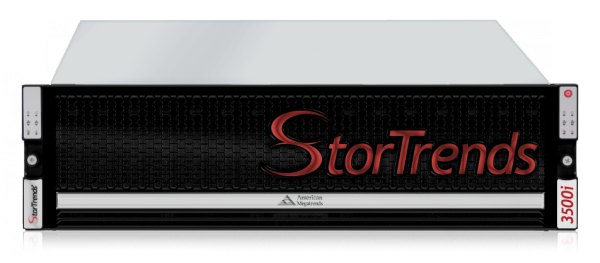AMI StorTrends 3500i demonstrates class-leading performance

We reported on the launch of AMI's StorTrends 3500i hybrid storage appliance for small and medium businesses back in April.
Now in independent testing by StorageReview Enterprise Lab the 3500i has shown class-leading performance against products from other major storage vendors. The unit achieved the highest transactions per second (TPS) and lowest latency compared to other hybrid products.
"The real magic of the StorTrends 3500i comes from the control it offers to customers," says Brian Beeler of StorageReview. "The array supports both SSD caching and tiering, which is somewhat novel in the hybrid space, and a feature called Automatically Tuned Volumes (ATV). ATV gives users a high-degree of control over what kind of performance an individual volume receives by selecting the storage it sits on, and allowing admins to prioritize (or not) the performance. StorTrends arrays also include a robust set of enterprise-ready data services and the ability to scale up with additional disk enclosures".
The 3500i's strong performance is backed by a solid set of enterprise-friendly features. These include support for snapshots along with thin provisioning, replication, WAN data services and archiving with deduplication. The system supports popular RAID standards and can be managed with an easy to use web-based GUI.
"The StorTrends 3500i was the top-performing array in the majority of the lab tests run by StorageReview. This is a testament to the SSD caching, SSD tiering, Automated Tuned Volumes and other key technological features within the StorTrends 3500i. With more than 300 patents it's clear to see why StorTrends is a frontrunner in the Hybrid Array Lab Report," says Justin Bagby, Director of StorTrends. "We are proud of the StorTrends 3500i benchmark results; and delighted that customers now have another undeniable proof point that its patented features provide the ultimate combination of extreme performance, optimal capacity and ease of use to meet their business application and budgetary requirements".
The full benchmark test results are available on the StorageReview website.
